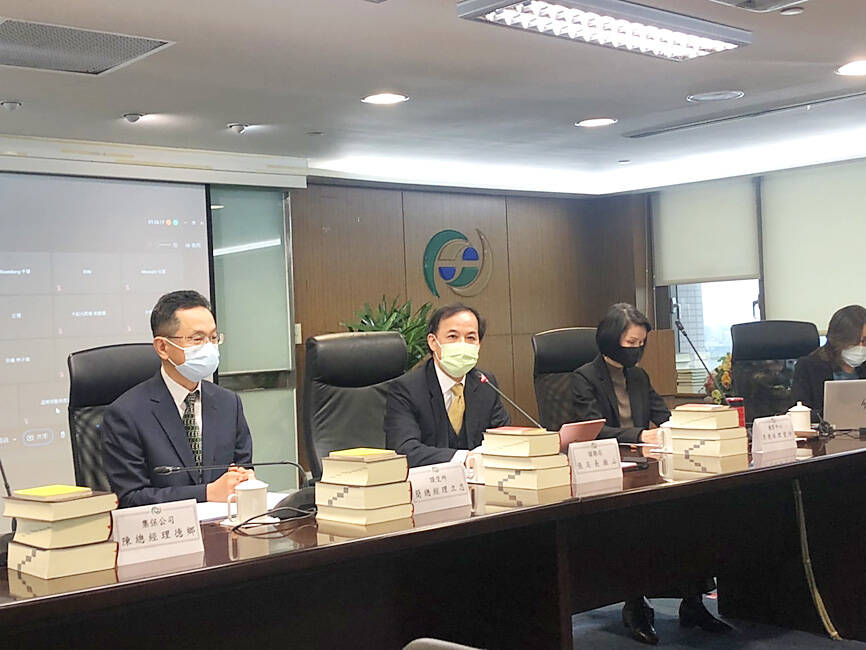The Financial Supervisory Commission (FSC) on Tuesday announced that companies planning initial public offerings (IPOs) must have at least one woman on their board of directors to boost gender equality among listed firms.
The announcement would affect a dozen companies planning IPOs on the Taiwan Stock Exchange (TWSE) and the Taipei Exchange (TPEX) this year, Securities and Futures Bureau Deputy Director Sam Chang (張振山) told a news conference in Taipei.
Six out of 32 firms planning to list on the TWSE and five out of 24 looking to debut their shares on the TPEX do not have female directors, TWSE president Chien Lih-chung (簡立忠) and TPEX chief executive officer Edith Lee (李愛玲) said, adding that some firms are making contingency plans to meet the new requirement.

Photo: Kelson Wang, Taipei Times
The TWSE and TPEX are considering giving firms time to install female directors before the end of the year, the commission said.
Listed companies scheduled to hold board elections next year are also required to have at least one female director, Chang said.
Currently, 497 listed companies, or 28 percent of the total, do not have female directors, he said.
As 163 companies plan to hold board elections next year, they must comply with this new requirement, he said.
From 2025, listed firms that do not meet the requirement that one-third of their board must be female will have to explain why and present improvement plans, he said.
“Women joining the board has become the international trend, which is crucial to promote diversity and corporate governance,” he said.
Asia is lagging behind Europe in terms of female representation on boards, Chang said.
Taiwan would be the third nation in Asia making female board members mandatory, after Hong Kong and Malaysia, he said.
South Korea requires only companies with assets larger than 2 trillion won (US$1.5 billion) to appoint one female director, he added.

With this year’s Semicon Taiwan trade show set to kick off on Wednesday, market attention has turned to the mass production of advanced packaging technologies and capacity expansion in Taiwan and the US. With traditional scaling reaching physical limits, heterogeneous integration and packaging technologies have emerged as key solutions. Surging demand for artificial intelligence (AI), high-performance computing (HPC) and high-bandwidth memory (HBM) chips has put technologies such as chip-on-wafer-on-substrate (CoWoS), integrated fan-out (InFO), system on integrated chips (SoIC), 3D IC and fan-out panel-level packaging (FOPLP) at the center of semiconductor innovation, making them a major focus at this year’s trade show, according

DEBUT: The trade show is to feature 17 national pavilions, a new high for the event, including from Canada, Costa Rica, Lithuania, Sweden and Vietnam for the first time The Semicon Taiwan trade show, which opens on Wednesday, is expected to see a new high in the number of exhibitors and visitors from around the world, said its organizer, SEMI, which has described the annual event as the “Olympics of the semiconductor industry.” SEMI, which represents companies in the electronics manufacturing and design supply chain, and touts the annual exhibition as the most influential semiconductor trade show in the world, said more than 1,200 enterprises from 56 countries are to showcase their innovations across more than 4,100 booths, and that the event could attract 100,000 visitors. This year’s event features 17

EXPORT GROWTH: The AI boom has shortened chip cycles to just one year, putting pressure on chipmakers to accelerate development and expand packaging capacity Developing a localized supply chain for advanced packaging equipment is critical for keeping pace with customers’ increasingly shrinking time-to-market cycles for new artificial intelligence (AI) chips, Taiwan Semiconductor Manufacturing Co (TSMC, 台積電) said yesterday. Spurred on by the AI revolution, customers are accelerating product upgrades to nearly every year, compared with the two to three-year development cadence in the past, TSMC vice president of advanced packaging technology and service Jun He (何軍) said at a 3D IC Global Summit organized by SEMI in Taipei. These shortened cycles put heavy pressure on chipmakers, as the entire process — from chip design to mass

SEMICONDUCTOR SERVICES: A company executive said that Taiwanese firms must think about how to participate in global supply chains and lift their competitiveness Taiwan Semiconductor Manufacturing Co (TSMC, 台積電) yesterday said it expects to launch its first multifunctional service center in Pingtung County in the middle of 2027, in a bid to foster a resilient high-tech facility construction ecosystem. TSMC broached the idea of creating a center two or three years ago when it started building new manufacturing capacity in the US and Japan, the company said. The center, dubbed an “ecosystem park,” would assist local manufacturing facility construction partners to upgrade their capabilities and secure more deals from other global chipmakers such as Intel Corp, Micron Technology Inc and Infineon Technologies AG, TSMC said. It